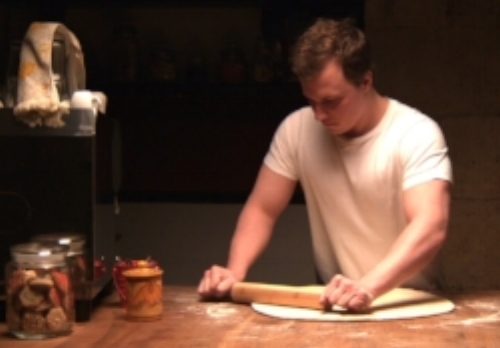Love the One You're With
/A Brief Commentary and Review
of “The Cakemaker”
A Film by Ofir Raul Graizer
by John Bennison, Mountain Shadow Director
“If you can’t be with the one you love,
love the one you’re with.”
- folk-rocker Stephen Stills, 1970
Ofir Raul Graizer’s eloquent first attempt with a feature film draws on a standard storyline with a twist. Boy meets boy. Boy loses boy. Boy meets girl who has lost the same boy. As another critic aptly describes it, the “The Cakemaker” is your classic love triangle, with a ghost in the middle. The death of a lover begins a bittersweet process; with a Black Forest gateau to ease the quiet, raw pain of grief.
Thomas is a reserved German pastry chef and café owner, living alone and seemingly content enough. Oren is an Israeli businessman from Jerusalem who frequents the café to savor its delicacies; which eventually includes Thomas.
Back home, Oren’s wife, Anat, is raising their son, Itai; while opening a café of her own, with the help of Motti, her brother-in-law. Motti is a strict orthodox Jew who secures her kosher certificate for the café; to keep her within the confines of religious rules and customs.
On a visit to Thomas, Oren forgets his keys and the box of cinnamon cookies for his wife back home. It’s the last time the doughboy will see his lover. When weeks pass without hearing from him, Thomas finally inquires with Oren’s former company and learns his fate. The unfolding story is a journey in grief. How can one grieve the loss of a clandestine love that cannot even be revealed?
Thomas is drawn to Jerusalem, posing as a nobody; disguising his identity in order to find hidden solace by immersing himself in rhe lives of the people and places of Oren’s former life. Slowly he befriends Anat and her son; with brief interludes assuming the typical family roles of husband, father, even lover. He eventually meets Oren’s mother, Hanna, who has a deep-knowing and unspoken understanding of who he really is, and the struggle he is going through.
Rummaging through Oren’s personal effects, stashed in a box, Anat begins the terrifying process of putting the pieces of the puzzle together. Still, she wants to imagine filling the void in her life with new hope and possibility. But Thomas’ deception slowly unravels like a slow-motion suspense drama, until his secret is finally exposed.
When they all learn Thomas’ true identity, it’s not only love lost twice, it’s the icing on the cake. Finé.
Except for the epilogue, which takes place a few months later.
But earlier, at one point during one of his visits to Berlin, Oren had shared photos of his son and wife, remarking, “It’s not good to be alone.”
“I’m not alone,” Thomas replied. “I have my work.” His work was comprised of the contemplative kneading of a ball of dough. It is a scene that’s repeated again and again throughout the film. It satisfies a basic need for Thomas; if only in a poignant and melancholy kind of way.
So, in response to Oren, Thomas recalled what the grandmother who had raised him -- and had died only shortly before meeting Oren --
always reminded him: “One should
appreciate what one has.”
In the epilogue, Anat travels to Berlin to see Thomas one last time, but only from a distance.
The film will end in just such a way for both Thomas and Anat. And, it will leave the viewer wondering if what is left to each of them would -- for us -- be enough?











